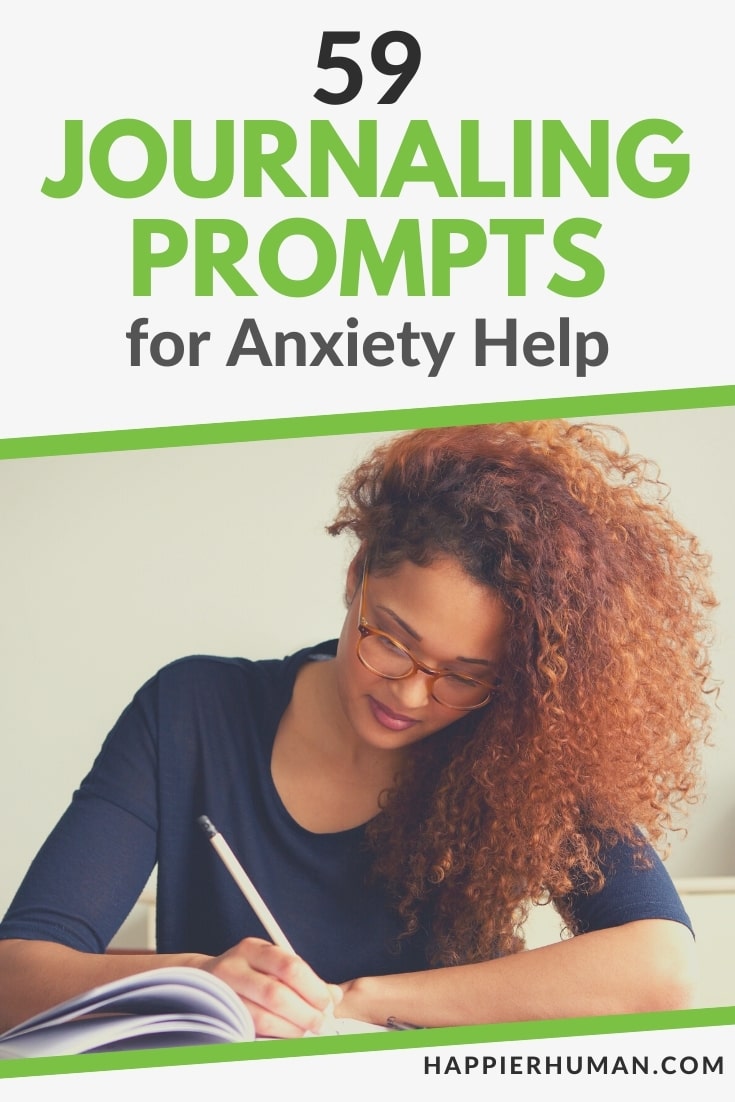Are you unsure of what to write in your journal to ease those feelings of anxiety?
If so, then you can use the following 59 journaling prompts for anxiety to free your mind from troubled thoughts.
Many people live in a perpetual state of anxiety.
One anxious thought often leads to another, and then another, until the person is surrounded by these thoughts. It becomes difficult to revert to a worry-free state of mind once these anxious thoughts take over.
In moments like this, journaling can help reduce anxiety. Studies have shown that writing about how a person feels has the potential to ease anxiety in people who have suffered from traumatic events (see information here).
Journaling prevents people from drowning in their own fearful thoughts. It also allows them to see their own strengths and discover nuances of their personalities.
Journaling also helps people find solutions to problems they have, as well as accept and learn to let go of things beyond their control.
Journaling Prompts for Anxiety (A Quick Infographic)
Looking for simple list of prompts you can use right away? If so, here a quick infographic that contains all the information we cover in this blog post. (That said, you might want to read below for a full explanation of each prompt.)

59 Journaling Prompts for Anxiety
Here are some writing prompts to help you on your journey.
1. What was the most difficult experience you had before, and how were you able to overcome it?
Recalling challenging times makes us see how far we’ve come, and might just inspire us to be grateful for all that has happened.
2. List three things that scare you the most, and the reasons why.
Facing the things that scare us lessens their power to make us anxious.
3. Recall three positive things that happened to you today and write them down. Be as detailed as possible.
Recalling positive things that happened in the day improves mood and motivation.
4. Reply to your inner critic’s opinions about your actions and decisions.
If it’s calling your attention to all the wrong things you’ve done, this is the time to focus on the right things you’ve accomplished, and to dismiss your inner critic’s poor opinion of you.
5. How are you feeling right now? Describe how you feel in writing.
Do you like how you’re feeling right now? If not, how would you like to feel? What can you do to change how you’re feeling?
6. List down all of the things that you’re worried about right now. Make the list as long as possible.
Putting all your worries out into the open prevents them from occupying too much space in your head.
7. Write a letter to three of your greatest supporters.
Think of the people who support you. Choose three of them. Then write a letter to each one detailing the ways they support you and telling them how much you appreciate them. You don’t have to mail the letters if you don’t want to.
8. What are the three things you’d love to be doing for the rest of your life?
Writing down the things you’d love to do even without receiving any compensation for them will help you reconnect with your passions.
9. Make a list of the compliments you’ve received from others.
Writing down the compliments you’ve gotten from others helps boost confidence and gives hope.
10. What are five moments in your life when you can say you were truly happy?
A study showed that people—especially teenagers—who recall happy memories are more resilient and less prone to depression.
11. Think back to a moment when you experienced failure. What lessons can you take from it?
Failure is necessary. It is considered the greatest teacher we’ll have in this life. Without it, we will be incapable of reaching for greater achievements.
12. Write a letter to yourself. Make it a love letter.
Discover how uniquely wonderful you are as you write about the admirable qualities you have.

Write a love letter for yourself.
13. If you’re prone to anxiety attacks, write down all the strategies you’ve used in the past that helped you cope with a flare up.
This list will help you realize that you’ve always managed to survive an attack, and will give you hope to overcome the condition.
14. Is your anxiety trying to tell you something? What is it?
Taking a closer look at your anxiety helps you discover the underlying reasons for your anxious thoughts, and hopefully motivates you to deal with them in a healthy way.
15. Describe the thing or situation that you look forward to every day.
Writing about things that give us joy anchors us and gives us strength to move forward.
16. List three of the greatest lessons you’ve been given by your anxiety.
Having anxiety changes our outlook about life. Writing about this can help you discover the new you that’s emerging.
17. List at least 10 activities you can do to take better care of yourself.
This is an action plan to help you remember that you (your health and well-being) are important.
18. What values are important to you?
Knowing which values you think are important helps you define your personal boundaries.
19. List down your anxiety triggers.
Knowing your triggers can help lessen the effect of symptoms during a flare up, or completely prevent them.
20. Think of someone who has caused you pain. Write him or her a letter of forgiveness.
Letting go of anger and resentment frees up our energy to be happier and more present in our own lives.
21. List down the questions that are constantly running through your head right now, and then try to answer each one.
The brain cannot engage in other thoughts while you’re trying to think of answers to questions you’ve posed for yourself. It’s a way to stop your tendency for rumination.
22. Write down your favorite inspiring quotes or song lyrics that motivate you.
Quotes are wonderful tools for taking you out of your head and spurring you into action.
23. List down the things that you are grateful for. Make the list as long as you can.
Practicing gratitude increases our happiness and makes us healthier, both in mind and body.
24. What is it that you need to let go of? Write your reasons for holding on to it.
Recognizing that we are hanging on to memories—especially painful ones—gives us the opportunity to finally let them go when we see how they are holding us back or causing our anxiety.
25. Write a letter to one or both of your parents. You don’t have to give the letter to them.
Writing to your parents can help clear up old issues or make you arrive at an understanding about the primary caregivers in your life.
26. Write two long-term goals. Brainstorm and write down your ideas for achieving them.
Goal-setting can help overcome some symptoms and aspects of anxiety. Write down your plan of action as clearly as possible.

27. Visualize that you are free from anxiety. Write down the details of this kind of life.
When you envision a life that’s different from what you have right now, your whole being works toward achieving it.
28. List 10 things that make you smile.
Recalling things that bring joy to us lifts our moods and changes our outlook.
29. List down three affirmations you can say to yourself today.
Positive affirmations can build our sense of self-worth and rewire our negative thinking, changing it to something positive.
30. What changes can I make to my morning routine to help with anxiety?
Ask yourself if there is an adjustment that you can make in your morning routine that can help relieve your anxiousness later in the day.
31. What changes can I make to my evening routine to help with anxiety?
Ask yourself if there are adjustments that can be made to your nighttime routine that can help you feel less anxious at bedtime and set you up for a successful day the next day.
32. When I feel anxiety, what is going on in my body, and how does it affect me?
When you feel anxiety, how does it materialize in your body? Do you feel nausea, dizziness, fatigue, difficulty concentrating, shortness of breath, or sleep problems?
33. What four achievements did you accomplish yesterday, big or small?
Did you push yourself to ask for a raise on your job? Though you've been anxious, did you ask your crush out on a date?
Did you have lunch with your mother, though she is constantly critical of you and triggers you? Whatever the accomplishment, large or small, journal and celebrate those things.
34. How is my anxiety actually helping me?
What is your anxiety actually protecting you from? Is it keeping you from being in the same room as your child's narcissistic father, who's still not over you? Are you anxious when being around a gas lighter who knows what to say to push your buttons?
Is there anxiety about seeing a friend or loved one in the hospital? Take note that there may be some wisdom in honoring the emotion that your anxiety can bring.
That wisdom may help you be more aware and soften the blow you feel when entering the situation.
35. What can I do to lessen the symptoms of anxiety?
What makes you feel the calmest and ushers in amazing feelings? Do you enjoy pulling out the old photo albums and looking at family photos?
Does listening to music soothe you? Do you enjoy taking a hot bubble bath to relax and calm you after a stressful day?
Please take note of these things and put them into action when you feel overly anxious and stressed after a rough day.
36. Are the things that make you feel the most anxiety internal concerns or external. Imagined or real?
When you think of the things daily that cause you the most anxiety, are they primarily internal factors that weigh on you mentally due to past failures? Are they external factors due to a person, place, or thing that has harmed you before?
Then, determine and journal if those things making you feel the most anxious are real or imagined fears (the what-ifs)? A valid threat or something you are hoping doesn't happen, and it's making you nervous.
37. Because I am still caught up in the past, what am I missing out on today?
Have you been so heartbroken about how a previous season of life ended that it’s keeping you from enjoying the new possibilities that today has to bring?
38. The last time I was overwhelmed with anxiety, what was happening?
What were you doing the last time you felt a wave of anxiety creep in? Were you taking a certification test for your job, meeting your boyfriend’s parents, or going to a doctor’s appointment?
Then, what did you learn about yourself throughout the experience?
39. How did you react the last time you felt overwhelmed with anxiety? Did it help? What would I do differently?
So, you felt overwhelmed when you made the presentation at work, or whatever brought on your anxiety.
Was there something you did to calm your nerves, like imagining everyone naked, breathing exercises, or practicing your speech several times before presenting it?
Then, ask yourself, is there anything you would have done differently. That way, you can be better prepared next time.
40. What am I speaking to myself daily that could be contributing to my anxiety?
What do you say to yourself every day? Are you saying, “No one cares for me.” “I can’t possibly do this.” Or “I’m going to fail.”
41. Challenge what you are speaking to yourself with things that are true.
Instead of saying, “I'm going to fail,” tell yourself, “I can do whatever I put my mind to.” Instead of saying, “No one cares for me,” challenge those words by making note of the family and friends who have always stood by your side.

See if pride is the reason you are standing alone.
42. Recall times you experienced success, even when you were flooded with anxious thoughts.
Reflect on the successes you have had personally and professionally during periods when you had tremendous anxiety.
43. What would the perfect day look like?
Would your perfect day be at the beach, a fishing trip at the lake, or time spent at home with your kids? Write a journal entry about an activity that would put you in the best mood mentally and emotionally.
44. What would you say if you could write a letter to anyone from your childhood? (Note: You don't have to send it.)
Writing a letter to someone who may have harmed you as a child and is the source of your current anxieties is a great way to get your feelings out on paper.
It is primarily a way to be honest with yourself and can begin a healing process to deal with anxiety.
45. What characteristics make me different than others around me?
Document and celebrate what makes you unique. Then, determine what it is that you offer the world that is hard to find in others around you.
This is a great way to release some anxiety and frustration so that you don’t expect “YOU” out of others around you.
46. ________ makes me sick.
Think of the things that you absolutely cannot stand. Sometimes, we have feelings of anxiety and don't know why. This list helps you identify triggers, your responses, and the after-effects of the situation.
47. What have been some of the most fulfilling times of your life?
What made you feel the most complete as a person? Then, look at what you were doing, where you were when it happened, and what it was about the situation that was so satisfying to you.
48. What advice would you give to your younger self?
Write things you could say to your younger self to offer wisdom and comfort. Doing this activity helps you see how you have become a better person on this side of the adversity you have faced in life.
49. What skills are you currently learning or are curious to learn?
You enjoy music, and it relaxes you. So, maybe learning to play guitar or piano is a skill you have picked up because it helps relieve anxiety as you play. Also, make a list of things you'd love to try, like painting or woodworking.
50. Write about what failure has taught you over the years.
Journal about what specific experiences taught you, even though you may have failed. My daughter was anxious about her spelling bee.
Still, after coming in second place, she became more confident in her ability to spell tricky words.
She surprised herself at her ability to sound words out and make adjustments to spell things she had never heard of.
51. Who is someone you wish you could spend time with?
There are people we can be around that help us feel better, no matter the day we’ve had. Write about those people and tell what it is about them that always seems to put you in a better mood.
52. What is a promise that I want to make to myself?
After journaling about what brings on great anxiety in your life, what mistakes you have made, and how you would do things differently, etc. Write a promise to yourself that, if you follow through on it, it will help you feel less anxiety in the future.
53. What good self-care activities can I do to relax when things have been overwhelming?
You could write about some practical self-care ideas like eating healthier to boost your mood or drinking plenty of water to improve your sleep quality.
Moreover, you could also journal about activities like attending a performance, reading, relaxing with your furry friend, or going on a nature walk.
54. What is your favorite season of the year, and why?
Is your favorite season of the year wintertime, when we can sit in front of the fireplace and snuggle under a blanket while watching the snow fall outdoors.
Do you favor spring when flowers are in full bloom, trees are green and full, and the animals are running around at play?
Additionally, you could tell of your love for summer and how you enjoy the warm weather, time soaking in the swimming pool, and the longer days.
Perhaps, your favorite season is autumn, when the leaves change color, the pumpkin spice everything, and the air is crisp.
55. What or what in your life makes you feel safe?
Write about the people, fur babies, plants, or other things that make you feel safe and secure. Is there something about the environment that immediately puts you at peace?
56. Who is one person who has enriched your life in some way, though you’ve never met?
Many of us look up to celebrities and social media icons who have encouraged us with their stories of strength and resilience.

They went through difficult times with grace while in the public eye. Write about those people and others who inspire you with their words of wisdom and unique perspectives that you've adopted into your life, and they have made you better.
57. What are three things that the “you” of yesterday would love about the “you” today?
Writing these things will help you appreciate how far you have come and remind you that you didn't let yourself down despite setbacks, bad decisions, and failures.
58. Who makes your life better regularly, yet you’ve never told them?
Who is it that you certainly couldn't or wouldn't want to live without? They are those people who are always a shoulder for you to lean on. They put up with your complaints and never seem inconvenienced when you call or stop by unannounced to vent.
After you are done, they offer the best advice and great words of encouragement. Still, you've never told them what their kindness has meant to you.
59. Journal about songs that you’ve been singing lately.
These could be songs you've listened to “on repeat” to get you through rough days. They could be songs with catchy tunes, lyrics, or new songs you love. What is it about them that you enjoy so much?
Final Thoughts on Journaling Prompts for Anxiety
There you have it—29 journaling prompts for anxiety to help you achieve a sense of peace.
It is a challenge to live with any anxiety disorder. However, the outlook is not bleak. Anxiety can be overcome. The fact that you’re reading this article is proof that you’re taking control of your life.
One of the ways to overcome anxiety is to keep a journal. We hope that the writing prompts found in this post will be instrumental in your recovery.
Also, if your feelings of anxiety threaten to overwhelm you and affect your quality of life, it would be a good idea to seek professional help.
And if you want to see additional information on this topic, then check out our article on the 45 affirmations for anxiety.
And if you're looking for more articles about anxiety, be sure to check out these blog posts:
- 11 Soothing Mantras to Help You Deal with Anxiety
- 8 Simple Steps to Get Rid of Your Morning Anxiety
- 20 Grounding Techniques to Reduce Anxiety & Cope With PTSD
Finally, if you want a simple way to reduce your stress and anxiety, then try writing these 35 mindfulness journaling prompts to live more in the present moment.


